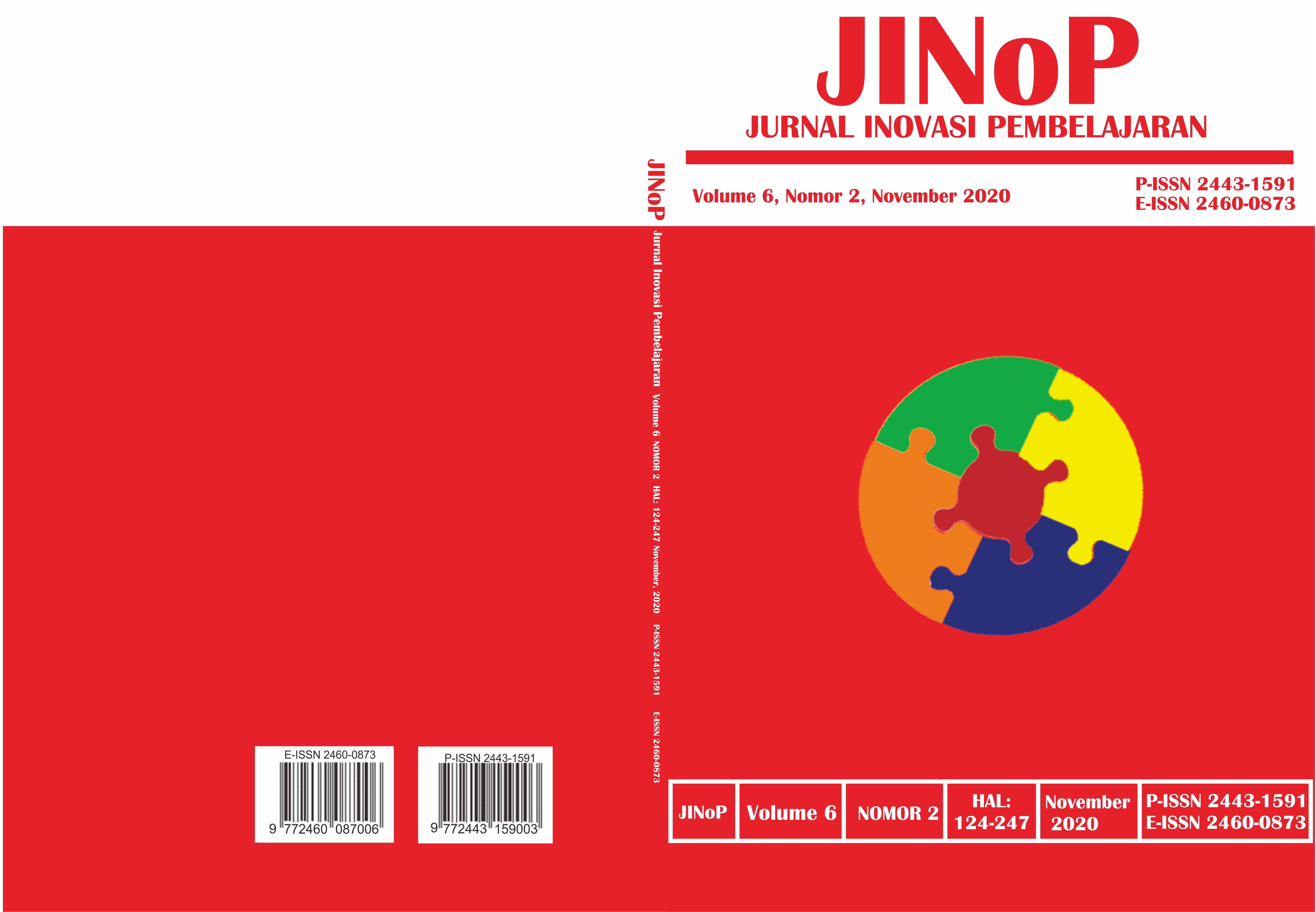Peningkatan kemampuan berdebat melalui model pembelajaran learning cycle 5E dengan bantuan peta konsep siswa G-2
DOI:
https://doi.org/10.22219/jinop.v6i2.8024Keywords:
Kemampuan Berdebat, Model Learning Cycle 5E, Peta KonsepAbstract
Model pembelajaran Learning Cycle 5E sangat cocok untuk memacu dan mendorong siswa agar aktif menyampaikan ide/gagasan dalam praktik berdebat. Penelitian ini bertujuan untuk meningkatkan keterampilan berdebat melalui model pembelajaran Learning Cycle 5E dengan bantuan peta konsep siswa G-2 SMA Negeri 3 Malang. Pemilihan Bantuan media peta konsep diharapkan dapat membantu siswa agar lebih terarah dalam pemahaman konsep serta penyampaikan ide/gagasan. Subjek penelitian ini adalah siswa kelas G-2 SMA Negeri 3 Malang pada semester genap tahun pelajaran 2018/2019 yang berjumlah 32 orang. Jenis penelitian ini adalah penelitian tindakan kelas (PTK) dengan rancangan yang bersifat kolaboratif. menggunakan 2 siklus dalam penerapannya. Teknik pengumpulan data yang digunakan dalam penilitian ini adalah observasi, praktik, dan, wawancara. Kemampuan berdebat siswa kelas G-2 SMAN 3 Malang melalui penerapan model pembelajaran Learning Cycle 5E dengan bantuan peta konsep mengalami peningkatan dari prasiklus, siklus I, dan siklus II. Pada nilai rata-rata hasil praktik berdebat pada siklus I yaitu 78,3 dengan jumlah ketuntasan sebanyak 24 siswa atau (75%) . Pada pembelajaran siklus II nilai rata-rata praktik berdebat siswa yaitu 83,8 % dengan jumlah ketuntasan sebanyak 30 siswa atau (93,7%). Kesimpulan penelitian menunjukkan bahwa penerapan model pembelajaran Learning Cycle 5E dengan bantuan peta konsep mampu meningkatkan kemampuan berdebat siswa.
Kata Kunci: kemampuan berdebat, model learning Cycle 5E, peta konsep
The 5E Learning Cycle learning model is valid for stimulating and encouraging students to actively convey ideas/ideas in debating practice. This research aimed to improve debating skills through the 5E Learning Cycle learning model with the help of concept maps for G-2 students of SMA Negeri 3 Malang. Selection of concept map media assistance is expected to help students to be more focused in understanding concepts and conveying ideas. The research employed 32 students of G-2 class SMA Negeri 3 Malang in the even semester of the 2018/2019 academic year as the research subject. This research employed a classroom action research (CAR) with a collaborative design using 2 cycles in its application. The data collection techniques used in this research were observation, practice, and interviews. The debating ability of G-2 class students of SMAN 3 Malang through the application of the Learning Cycle 5E learning model with the help of concept maps has increased from pre-cycle, cycle I, and cycle II. The average value of the results of debating practice in cycle I was 78.3 with 24 students or (75%) completeness. In the second cycle of learning the average value of students' arguing practice was 83.8% with the total completeness of 30 students or (93.7%). The conclusion of the research shows that the application of the 5E Learning Cycle learning model with the help of concept maps can improve students' arguing skills.
Keywords: debating ability, 5E Cycle learning model, concept map
Downloads
Downloads
Published
How to Cite
Issue
Section
License
Copyright (c) 2020 Sintawati et al

This work is licensed under a Creative Commons Attribution 4.0 International License.
Copyright Notice
Authors who publish with JINoP (Jurnal Inoasi Pembelajaran) agree to the following terms:
- For all articles published in the JINoP (Jurnal Inovasi Pembelajaran), copyright is retained by the authors. Authors give permission to the publisher to announce the work with conditions. When the manuscript is accepted for publication, the authors agree to the automatic transfer of the publishing right to the publisher.
- Authors retain copyright and grant the journal the right of first publication with the work simultaneously licensed under a Creative Commons Attribution 4.0 International License. that allows others to share the work with an acknowledgment of the work's authorship and initial publication in this journal.
- Authors are able to enter into separate, additional contractual arrangements for the non-exclusive distribution of the journal's published version of the work (e.g., post it to an institutional repository or publish it in a book), with an acknowledgment of its initial publication in this journal.
- Authors are permitted and encouraged to post their work online (e.g., in institutional repositories or on their website) prior to and during the submission process, as it can lead to productive exchanges, as well as earlier and greater citation of published work (See The Effect of Open Access).








